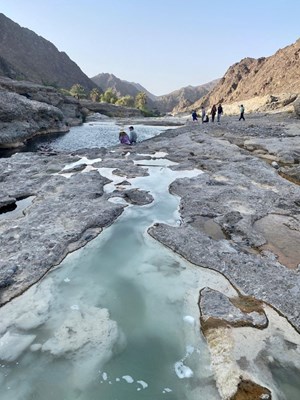News
U.S. Department of Energy convenes bilateral engagement on geologic hydrogen
It is a common misconception that H2 does not exist as H2 in nature and that producing H2 requires splitting it from other molecules, such as methane (CH4) or water (H2O). However, scientists have known for some time that H2 also occurs naturally, generated through geologic processes. These processes are so clearly at work in the Samail ophiolite in the Sultanate of Oman that with the naked eye, you can see H2 bubbling up out of springs of water not far from the capital city, Muscat. Indeed, the participants of the U.S.-Oman Technical Workshop on Geologic H2 witnessed the phenomenon themselves during a field visit on September 25.
It is now considered likely that large quantities of geologic H2 exist in the Earth’s subsurface. If it is proven that it can be produced at low-cost and at scale, it could be an entirely new, carbon-free energy source that could accelerate the energy transition. This would be a paradigm shift from conceptualizing H2 as a mere energy carrier to it being a primary energy source. This possibility is the exciting rationale for ARPA-E’s $20-MM Funding Opportunity Announcement to Explore the Potential for Geologic H2.
U.S. Department of Energy’s (DOE’s) Office of International Affairs partnered with Oman’s Ministry of Energy and Mineral Resources (MEM) to convene a U.S.-Oman Technical Workshop on Geologic H2 on September 24 in Muscat, Oman. With speakers on both sides from government, the private sector, and academic, the purpose of the workshop was to share information and ideas about geologic H2 and facilitate new policymaking, commercial, and academic partnerships between our two countries on this topic. Additionally, workshop participants witnessed the signing of a Memorandum of Understanding between MEM and Eden, a DOE/ARPA-E awardee, regarding the exploration and production of geologic H2 in Oman.
Oman’s unique geology is an exciting test bed for experiments that will help prove—or disprove—the potential for commercially producing geologic H2 at scale. Perhaps one day we’ll look back on this workshop—the first bilateral engagement on geologic H2 ever held anywhere—as an important step developing an entirely new clean energy source.


